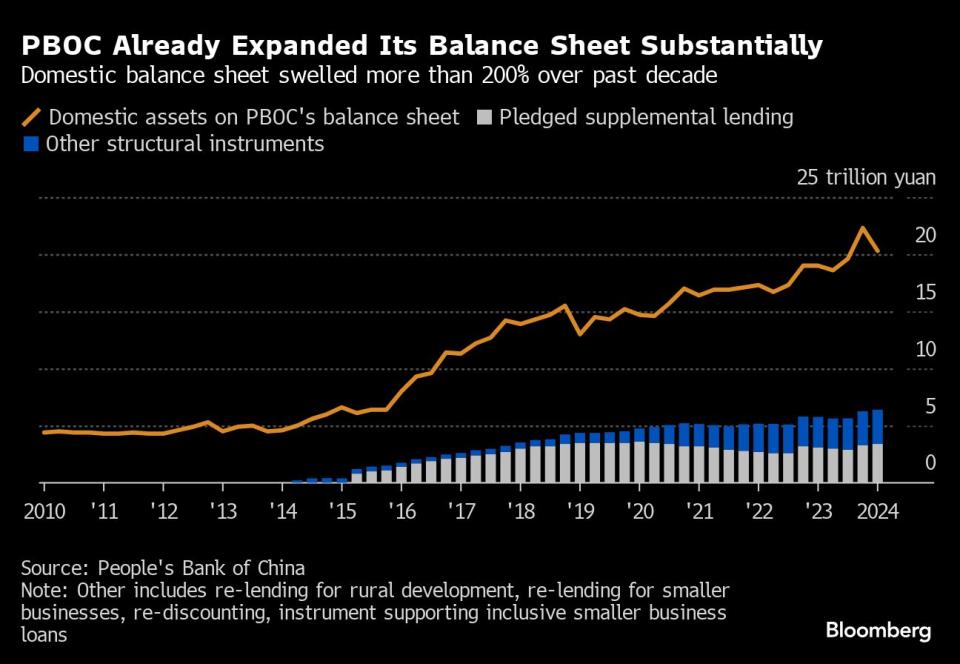How Xi Can Surprise World With Big-Bang Moves at China Plenum

(Bloomberg) -- China has the firepower to end its housing crisis at a high-stakes policy meeting, including with a “big-bang solution” that involves pumping money like the Federal Reserve. But it’s unlikely to pull the trigger.
Most Read from Bloomberg
Saudis Warned G-7 Over Russia Seizures With Debt Sale Threat
Archegos’ Bill Hwang Convicted of Fraud, Market Manipulation
NATO Singles Out China Over Its Support for Russia in Ukraine
Modi’s Embrace of Putin Irks Biden Team Pushing Support for Kyiv
That’s according to Bloomberg Economics, which said if the People’s Bank of China printed money on a scale similar to the Fed during the global financial crisis, it could finance the purchase of about 70% of the unsold property stock.
“That’s a big-bang solution that would result in significant collateral damage — we don’t think Beijing would go that far,” economists David Qu and Chang Shu said. “Still, it shows the potential for policy solutions.”
The Third Plenum, set for July 15-18, is one of the most important political meetings of the Chinese Communist Party. It’s expected to unveil a series of economic reforms and policies aimed at addressing long-standing issues that have impeded growth and recovery. Property polices are a key area of focus, as the real estate downturn remains the biggest threat to the economy.
The PBOC in May announced a $41 billion program to help state-owned firms buy unsold housing stock. “That’s a promising approach, but so far insufficient to address the scale of the problem,” the Bloomberg economists wrote in a note. This would pay for less than 1% of unsold housing inventory, they said.
Bloomberg Economics looked at three scenarios for how much money the PBOC could print to help local governments buy up unsold houses.
If the PBOC expanded its balance sheet by about 24 trillion yuan ($3.3 trillion yuan) — similar to what the Fed did from 2008 to 2014 — it would pay for around 70% of the unsold housing stock in China.
An expansion of 13 trillion yuan — similar to the European Central Bank from 2009 to 2012 after the European debt crisis — would finance the purchase of about 40% of the inventory.
The flip side is that quantitative easing of this scale would come at the cost of rapidly rising debt, pressure on the yuan to fall, faster inflation and much heavier debt loads for state-owned firms and local governments, Bloomberg Economics said.
The most likely option would resemble China’s “shanty-town redevelopment” program from 2015 to 2018, which tore down older homes nationwide and replaced them with new apartments. A repeat of this program, with the central bank providing 3.6 trillion yuan to banks, would finance the purchase of 10% of the stock of unsold homes.
It could also provide low-cost homes for 1.6% of China’s population, Bloomberg Economics said. This would raise growth by 0.2 percentage points this year and a full percentage point in both 2025 and 2026, they estimate, as banks make more loans and confidence would increase due to the support.
“Of course, quantitative easing is not a free lunch,” the economists wrote. “Adding to yuan depreciation pressure, renewing moral hazard and zeroing out future policy space are among the costs.”
Most Read from Bloomberg Businessweek
At SpaceX, Elon Musk’s Own Brand of Cancel Culture Is Thriving
Ukraine Is Fighting Russia With Toy Drones and Duct-Taped Bombs
©2024 Bloomberg L.P.

 Yahoo Finance
Yahoo Finance 